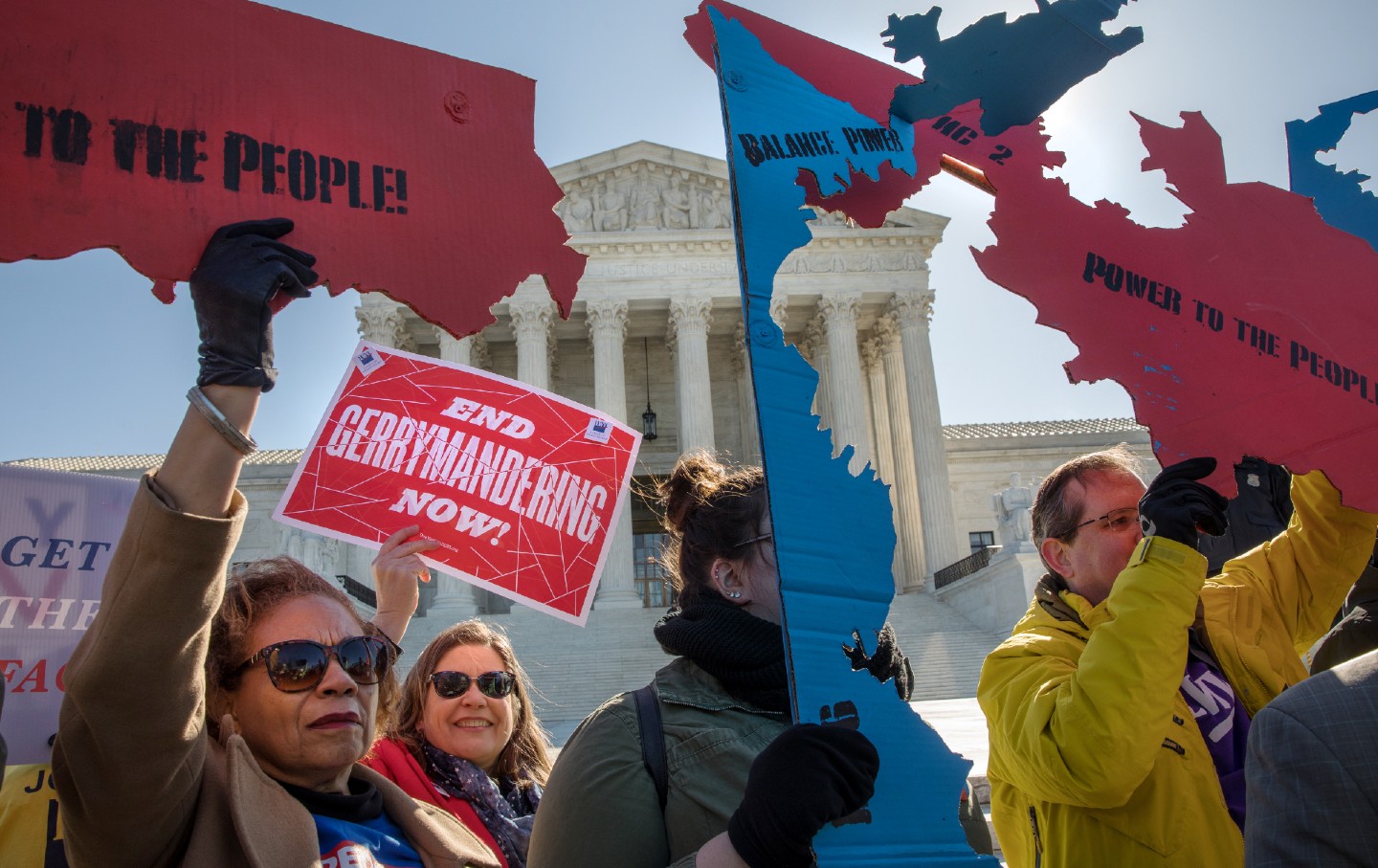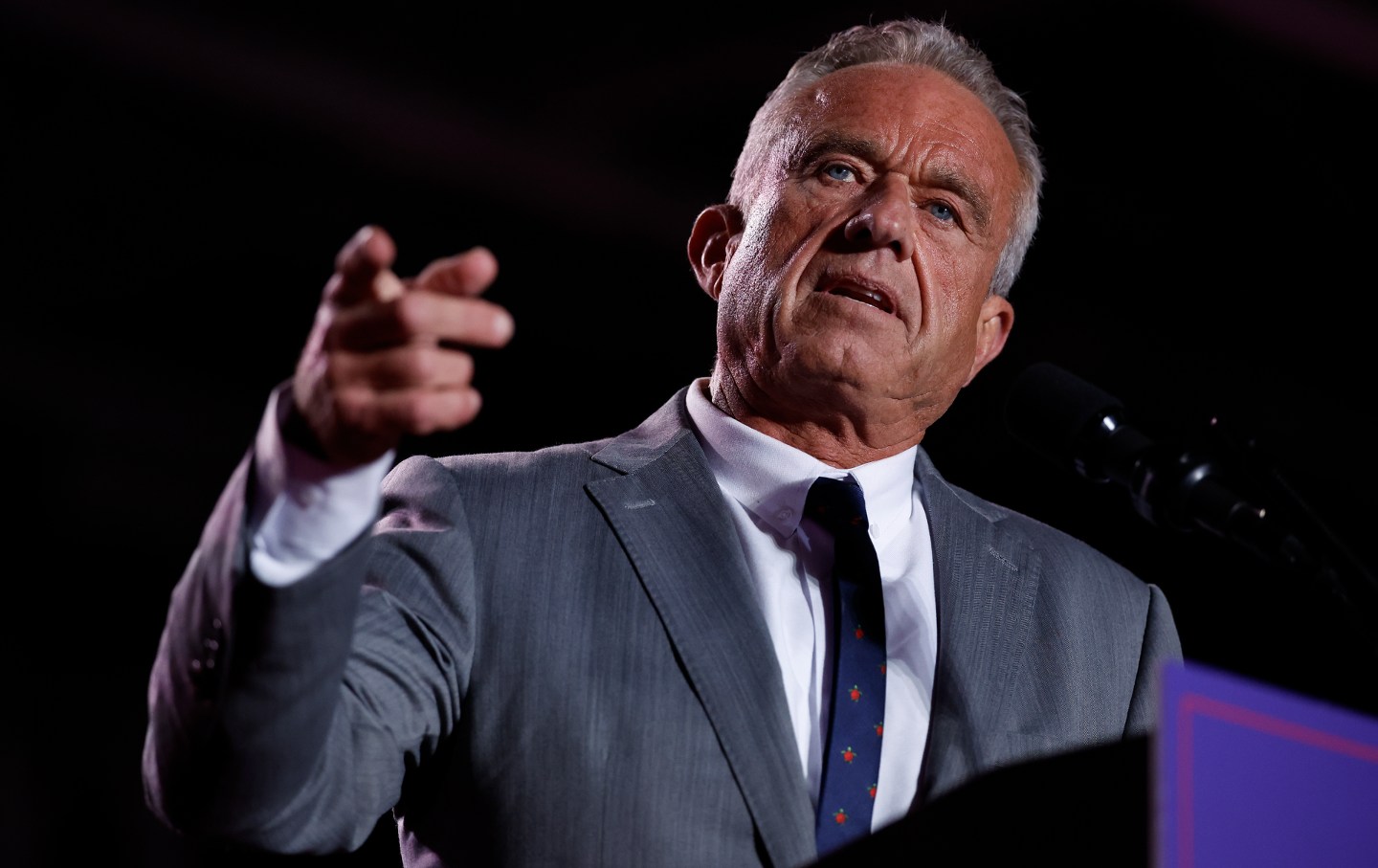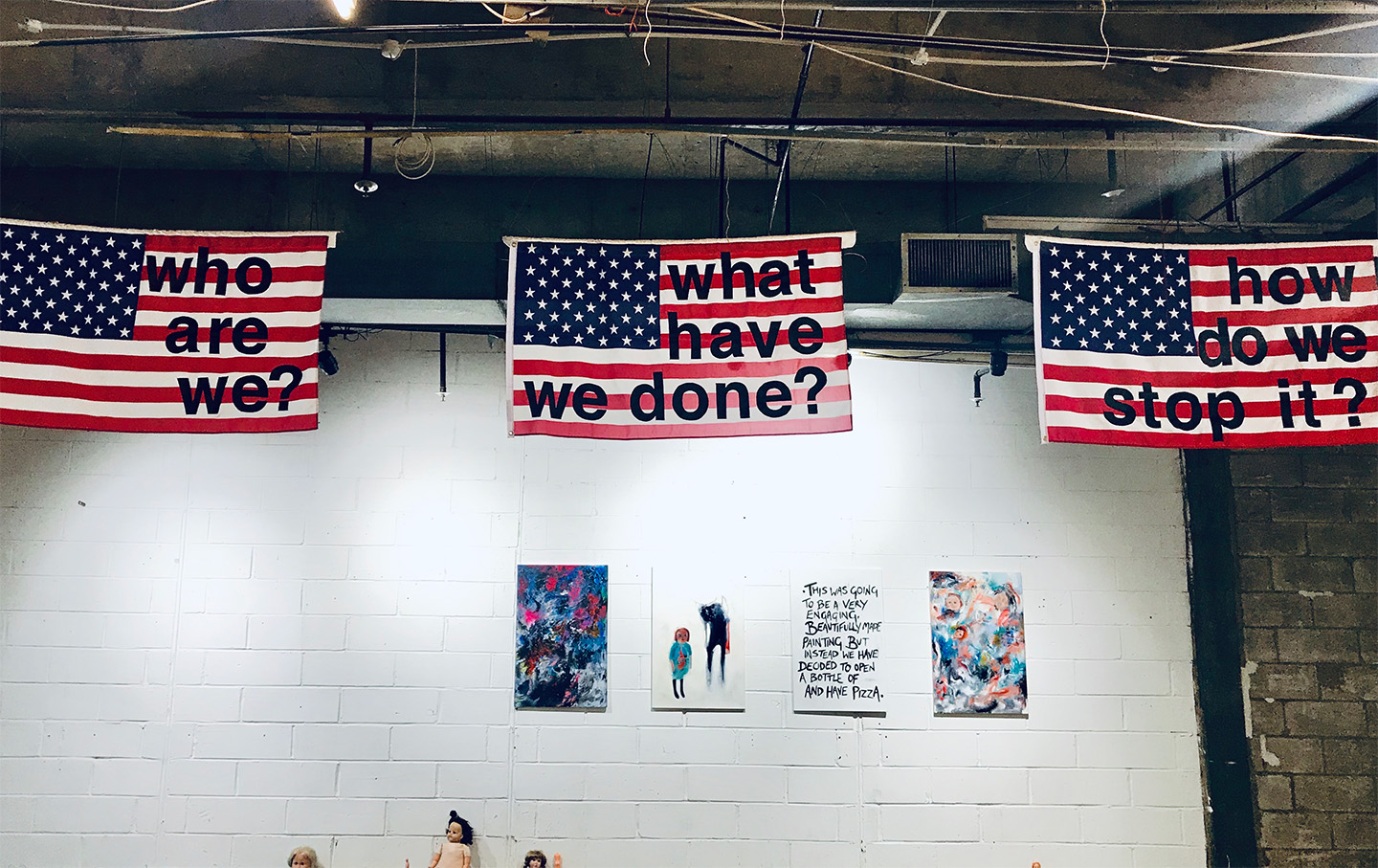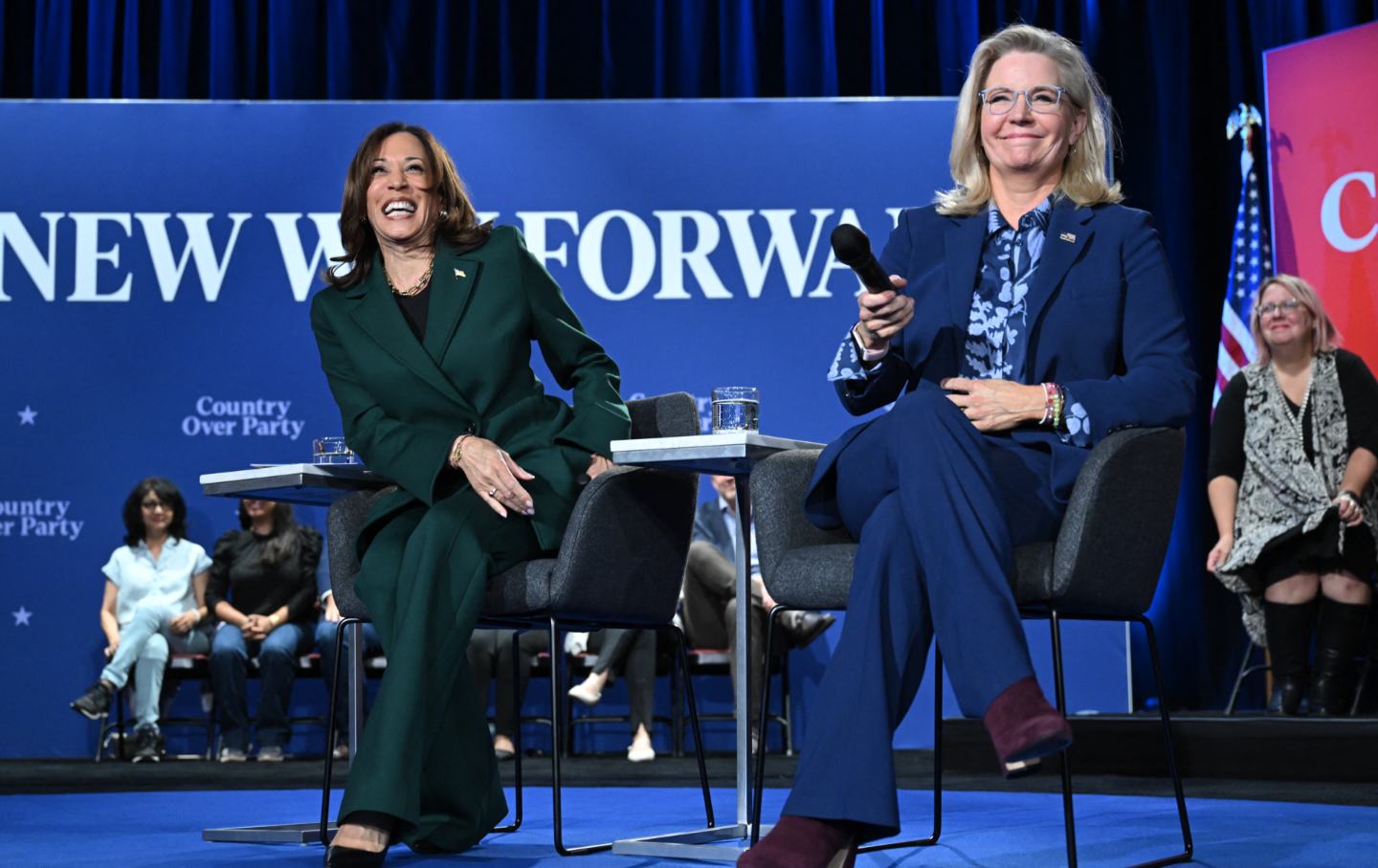The Supreme Court Is Going to Rubber-Stamp Racial Gerrymandering
The court has found a loophole that could allow districts to exclude Black voters—and still call it constitutional.

Demonstrators protest against gerrymandering at a rally at the Supreme Court Building during the landmark gerrymandering case Rucho v. Common Cause in 2019.
(Evelyn Hockstein / For The Washington Post via Getty Images)The Supreme Court heard oral arguments yesterday in Alexander v. South Carolina State Conference of the NAACP. The case involves an NAACP-led challenge to South Carolina’s congressional electoral maps, specifically South Carolina’s District 1, which is currently occupied by Nathaniel Hawthorne Sparknotes reader Nancy Mace. In October 2021, a federal district court panel ruled that South Carolina unconstitutionally used race as the predominant factor when drawing that district.
The central fact of the case—that the South Carolina legislature moved thousands of Black voters, mainly in Charleston, out of District 1 and shoved them mainly into District 6 (a majority-minority district currently represented by Representative Jim Clyburn)—is undisputed. The legal question is “why.” South Carolina Republicans argue that the Black voters were moved not because of their race, but because Republicans were trying to make District 1 safer for a Republican candidate by excluding Democrats.
The case is significant because it’s the first racial gerrymandering case to make its way to the Supreme Court since Chief Justice John Roberts invented an entirely new standard for these kinds of cases in 2019’s Rucho v. Common Cause. In that case, Roberts ruled (and his conservative buddies agreed) that political gerrymanders are “non-justiciable”—meaning federal judges can’t stop states from gerrymandering away political power from one party or another—but that racial gerrymanders are both justiciable and unconstitutional. The gaping and obvious loophole in Roberts’s ruling was the likelihood that every state that unconstitutionally uses race to gerrymander away voting power would claim that they were just being political.
Alexander v. South Carolina NAACP is the case that tries to take advantage of that loophole. The district court found that South Carolina not only moved thousands of Black people out of District 1, but it also kept counties dominated by white Democrats in the district. The district court also found that South Carolina kept counties in the district that had Black Voter Adult Participation (BVAP) rates under 17 percent of the total population, but excluded counties where BVAP was higher than that. To say these were “political” and not “racial” decisions saps those words of any meaning. This case is basically a test of whether Roberts’s Rucho decision still allows for racist gerrymanders to be stopped, or whether the most obvious and bad faith racist gerrymanders can simply be called “political” while the Roberts court turns a blind eye.
Predictably, Roberts failed the test. Roberts showed up to oral arguments with his head buried so deep in the sand that Caterpillar probably needed to send an excavator over to dig him out and reunite him with his family. He argued that the evidence of unconstitutional racial intent was “purely circumstantial” and suggested that finding unconstitutional racial bias in this situation would be a break from Supreme Court norms. Lawyers for the NAACP brought up evidence, found by the district court, that the South Carolina mapmakers literally had racial demographic data on their computer screens while they were drawing their maps, but Roberts, and Justice Samuel Alito, argued that merely being “aware” of the racial data did not mean that the mapmakers were using it to make their line-drawing decisions.
Justice Elena Kagan pointed out that people engaged in creating unconstitutional racial gerrymanders rarely announce their intention to do so, but Roberts appeared unmoved by that obvious fact. Kagan, and Justices Sonia Sotomayor and Ketanji Brown Jackson, all used their questioning time to emphasize that the district court is supposed to be the “finder of fact” in our system, while the Supreme Court is supposed to review for legal errors—and in this case, the district court ruled that there was impermissible racial bias as a matter of the factual record.
The conservatives didn’t care. While Roberts was busy pretending that racism was an unknowable thing, alleged attempted rapist Brett Kavanaugh deployed a different trope to deny racism exists: the invocation of a Black friend.
That Black friend was Representative Jim Clyburn. As I mentioned, District 1 cuts through the city of Charleston and shoves its majority Black precincts into Clyburn’s District 6. ProPublica reported back in May that this Republican plan was essentially approved by Clyburn, a Democrat, increasing the safety of his district at the expense of making District 1 more competitive.
Kavanaugh used his questions to allude to the Clyburn deal, and South Carolina’s lawyer, John Gore (most famous for trying to insert the citizenship question into the Census when he was part of Donald Trump’s Department of Justice), happily picked up the hint, calling out Clyburn by name and saying that a map he had suggested was nearly identical to the one the Republicans went with.
Now, I don’t think that Brett Kavanaugh, of all people, would change his mind if Clyburn had opposed District 1 as a racial gerrymander and denounced it. Kavanaugh does not actually care what Clyburn thinks. He would have just found a different Black friend—perhaps South Carolina Senator Tim Scott or maybe whoever hooks him up with Clemson football tickets—to make his point. Indeed, I’m not even sure it’s fair to knock Clyburn for making a selfish political decision that the vast majority of congresspeople would also make to entrench their hold on power.
But white folks seem to be treating Clyburn like he is the king of Black people ever since Chadwick Boseman (another proud South Carolinian) died. The fact that Clyburn chose his personal political interests over greater Black voting power in his own state certainly makes it easier for justices who are obsessed with their own media coverage, like Kavanaugh, to turn a blind eye to racial injustice. It’s Halloween season, and Clyburn handed these people a mask.
If this were a close case, I’d be worried that cover Clyburn provided for the justices to go all in on racist gerrymandering would be a problem. But, based on oral arguments, it’s not going to be a close case. It’s going to be 6-3, straight down party lines, with Roberts writing some garbled opinion in which he criticizes the NAACP for not proving that racism exists, without explaining what evidence of racism he would find persuasive. Kavanaugh’s Clyburn-based concurrence will be for the stenographers at The New York Times, and not legally decisive in any way.
Popular
“swipe left below to view more authors”Swipe →Where that leaves the future of racial gerrymandering will be exactly where it’s been since Rucho: Republicans are free to do it; they just have to lie about why. And lying comes as easy to Republicans as using antidemocratic institutions to impose minority rule.
Congratulations to Representatives Clyburn and Mace on their 2024 reelections. I guess voters in Charleston can now worry about other things.
We cannot back down
We now confront a second Trump presidency.
There’s not a moment to lose. We must harness our fears, our grief, and yes, our anger, to resist the dangerous policies Donald Trump will unleash on our country. We rededicate ourselves to our role as journalists and writers of principle and conscience.
Today, we also steel ourselves for the fight ahead. It will demand a fearless spirit, an informed mind, wise analysis, and humane resistance. We face the enactment of Project 2025, a far-right supreme court, political authoritarianism, increasing inequality and record homelessness, a looming climate crisis, and conflicts abroad. The Nation will expose and propose, nurture investigative reporting, and stand together as a community to keep hope and possibility alive. The Nation’s work will continue—as it has in good and not-so-good times—to develop alternative ideas and visions, to deepen our mission of truth-telling and deep reporting, and to further solidarity in a nation divided.
Armed with a remarkable 160 years of bold, independent journalism, our mandate today remains the same as when abolitionists first founded The Nation—to uphold the principles of democracy and freedom, serve as a beacon through the darkest days of resistance, and to envision and struggle for a brighter future.
The day is dark, the forces arrayed are tenacious, but as the late Nation editorial board member Toni Morrison wrote “No! This is precisely the time when artists go to work. There is no time for despair, no place for self-pity, no need for silence, no room for fear. We speak, we write, we do language. That is how civilizations heal.”
I urge you to stand with The Nation and donate today.
Onwards,
Katrina vanden Heuvel
Editorial Director and Publisher, The Nation
More from The Nation

The Red Wave Didn’t Hit Statehouses in This Election The Red Wave Didn’t Hit Statehouses in This Election
State-level Democrats largely held their ground, even scoring key victories in battleground states—and under Trump, that’s going to matter.

How Nominally Pro-Choice RFK Jr. Can Get Anti-Abortion Groups to Back His HHS Nomination How Nominally Pro-Choice RFK Jr. Can Get Anti-Abortion Groups to Back His HHS Nomination
He can pick a strident abortion opponent like Roger Severino, who wrote the Project 2025 chapter on HHS, as his number two.

Red Flags Red Flags
The result of the presidential election reflects individual and collective responsibility.

How Loyalty Trumps Qualification in Trump Universe How Loyalty Trumps Qualification in Trump Universe
Meet “first buddy” Elon Musk.

Bury the #Resistance, Once and For All Bury the #Resistance, Once and For All
It had a bad run, and now it’s over. Let’s move on and find a new way to fight the right.

Trans People Shouldn’t Be Scapegoated for Democrats’ Failures Trans People Shouldn’t Be Scapegoated for Democrats’ Failures
Politicians and pundits are stoking a backlash to trans rights in the wake of the election. They’re playing a dangerous game.


